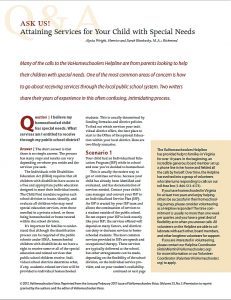FAQs: Special Needs and the Public Schools
According to the Virginia Department of Education’s page dedicated to special education, the Individuals with Disabilities Education Act (IDEA) requires that all children with disabilities have available a free, appropriate public education designed to meet their individual needs in conformity with the child’s Individualized Education Program (IEP). Both the regulations and the United States Department of Education’s General Administrative Regulations (EDGAR) make clear that public education is not the only alternative for children with disabling conditions. However, children who are being educated in home instruction programs are still entitled to take part in related services provided by the school division for which they are eligible. School divisions must remain ready to serve these children when parents seek services either through regular enrollment or as nonpublic students.
The services will vary from school district to school district and are likely to be less frequent than those services provided when/if your child was once enrolled in the public school system.
Related Pages
The January-February 2017 issue of VaHomeschoolers Voice magazine contains the article entitled “Attaining Services for Your Child with Special Needs” in which two homeschoolers share their experience and professional knowledge about how to navigate this often confusing process.
Other Frequently Asked Questions
Will my child’s Individualized Education Plan (IEP) still be valid if I educate her at home?
An IEP is a document in which the public school sets goals and promises to provide services for a child in school. The IEP is not binding on private schools or homeschools. When a child begins homeschooling, any IEP (Individual Education Plan) that the child had while in the public school system becomes an ISP (Individual Service Plan).
A previous IEP is still valuable to you, so keep it. Should your child go back to public school, or want accommodations for the College Board exams or at college, showing a copy of even an expired IEP is evidence that your child has a history of need. In addition, The College Board or any college will want to see current evidence, less than three years old, such as a signed letter from a physician or a neuropsychological evaluation.
I have a religious exemption. Can my child still receive therapy and/or special services through the local public schools?
Children exempted from compulsory education through religious exemption can still receive special services through their local public school. School divisions must provide special education services and programs to these students, but the level of services provided can vary at the discretion of the school division.
My school division doesn’t provide special services to homeschooled children. What are my legal options? How can my child get the services he needs?
Under section 612 of the Individuals with Disabilities Education Act (IDEA), your local school division is required to spend some money on services for students not in the public schools. It does not, however, create an entitlement that gives you the right to demand certain services. In other words, it is on their terms, not yours. You may have to go through lots of bureaucracy such as Individualized Service Plan (ISP) meetings and appeals. Some districts are better than others. Be polite but persistent. In extreme cases, a lawyer who specializes in education law might be helpful. Many have found that the hassle was just not worth the services provided.
My child’s speech therapist keeps on saying that my child would do better if he were in school. How can I educate the therapist about homeschooling and children with special needs?
Ask your child’s therapist upon what evidence they base their conclusion. Is it just a bias against home schooling, or do they feel that there is something wrong with you as a teacher or your home environment? Keep in mind that ignorance of homeschooling is different from opposition. Ask the therapist if the child would benefit from one-on-one instruction from a dedicated and involved teacher using a curricular approach custom designed for the child’s needs; a homeschooling environment can provide that.
Many professionals back down from their opposition to homeschooling if they meet or read about successful homeschoolers. In her book, Homeschooling Your Struggling Learner, Kathy Kuhl interviewed 64 families across North America who were homeschooling children with diagnosed learning challenges. Their stories are remarkable as they share the many benefits of homeschooling: the ability to customize curricula, provide one-on-one instruction, adapt the daily and yearly schedule to the child’s needs, and not have to deal with therapy and tutoring before or after school when the child is sleepy or tired.
Sharing stories such as these can often help those who know little about homeschooling. Hearing these stories can help them to recognize and appreciate the advantages homeschooling affords children with special needs.
This information is provided as a courtesy of The Organization of Virginia Homeschoolers. It is not intended as legal advice. For legal advice, contact a licensed attorney.
VaHomeschoolers is a non-profit public charity with 501(c)(3) status; your donation is tax-deductible to the extent provided by law.

